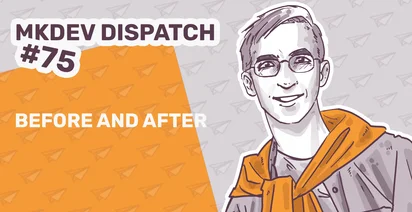Before and After | ✉️ #75

Hey! 👋
A new article by Paul Larsen, our Head of Data and AI, which he published just a few days ago on his personal blog (by the way, you should definitely subscribe), got me thinking that we’re going through a really interesting period right now.
See yourself. At first, everyone was talking about how AI was going to replace us all. Then came the phase of: “Well, actually, it's not that smart and probably it will never be.” And now, more and more, I keep coming across examples of work done, not by, but with AI, and debates around the quality of that help. Here are some examples.
In that same article, Paul catches AI giving a bad piece of advice. That in itself might not sound like a big deal, but it shows how the process has shifted. Instead of debugging his own code, Paul is now debugging the AI's output. With that we develop a new skill of understanding when AI is bullshitting.
Or take another example you've probably heard of. An AI-generated gif showcasing graphics from a non-existent open world video game. The internet immediately split up. Some was asking “Why don't we have games like this?” while others were explaining why building a game like that is technically impossible. But the result is we now have a bunch of indie developers are actually trying to make that exact game, using AI in the process.
Or here's a fresh one: the community is currently debating whether it’s reasonable to write 10,000 lines of code a day for a project. Of course, with AI help. Of course, by a super-productive solo entrepreneur. Clearly, no human can sensibly read through 10k lines of fresh code in a day, and it’s fair to argue whether any project even should be growing by 10k lines daily.
But that’s not the point. The point is that we’re now at a place on a timeline where this is a real conversation. Where we’re with all seriousness discussing whether 10,000 lines of code a day makes sense, how AI can help create a video game with visuals that are impossible to recreate with traditional tools, and what kind of skills are needed to catch an AI giving bad infrastructure advice.
This shift has already happened — so smoothly and so unnoticeably quickly that I think it's worth pausing for a moment and comparing the two pictures of the world. Before and after.
As I write this, the GPT-5 introduction stream is starting, so a new shift has probably already happened by the time you read this. A new Before and After.
What We've Shared
Podman: A Complete Overview. In this Dockerless Course lesson, Kirill Shirinkin explores Podman — a rootless, Docker-compatible container manager for Linux. It goes beyond Docker with features like pods, systemd integration, and auto-updates. Learn why Podman might be all you need to manage containers without Docker.
CRI and Cri-O: Kubernetes moved away from Docker, and this lesson by Kirill Shirinkin explains what replaced it and why. Learn how the Container Runtime Interface made tools like Cri-O possible—and why Cri-O now powers platforms like OpenShift. A must-read for anyone working with Kubernetes.
What We've Discovered
Valkey Turns One: How the Community Fork Left Redis in the Dust. Valkey, which is a Redis fork created when Redis changed its license some time ago, not only reached the first major version, but is also apparently outperforming Redis itself on various real world benchmarks. Now that Redis is properly open source again, We're curious how the situation is gonna evolve.
Frequent reauth doesn't make you more secure: Online systems became so secure, that we personally are exhausted from logging in or doing MFA procedures dozens of times per day. If you are building auth system - read this gem from Tailscale.
llms.txt A proposal to standardise on using an /llms.txt file to provide information to help LLMs use a website at inference time.
Migrating the Jira Database Platform to AWS Aurora: Atlassian moved million of databases from regular RDS to Aurora - and shared some insights and learnings from this process. Definitely cool to see usage of database per tenant approach at this scale.
Our Experience with Amazon Aurora Blue/Green Deployments Rare case study of using Aurora Blue/Green at scale, with actionable tips to follow for your own upgrade.
The 76th mkdev dispatch will arrive on Friday, August 22nd. See you next time!
